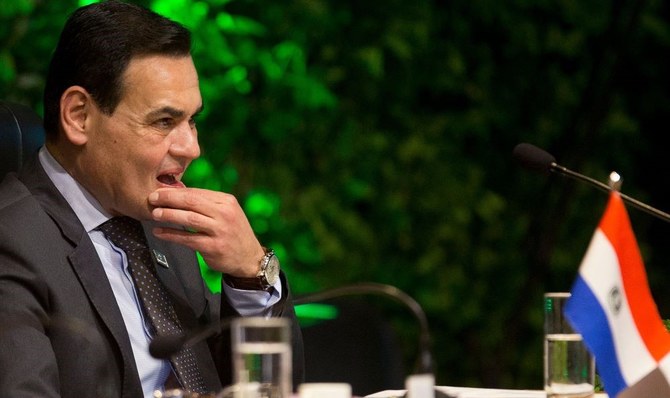
In Oscar Wilde’s masterful play “The Importance of Being Earnest,” which was first performed in 1895, Lady Bracknell famously says that “to lose one parent … may be regarded as a misfortune, to lose both looks like carelessness.”
Fast forward more than a century and, in a very different context, this same sentiment is today being felt in much of Brussels amid the potential failure of the EU’s trade negotiations with Mercosur (Brazil, Argentina, Paraguay and Uruguay). The possible collapse of these discussions comes swiftly on the heels of the failure of the bloc’s trade talks with Australia.
Speculation had grown that an EU-Mercosur deal could be concluded this week. However, that prospect seems to have been extinguished after comments from incoming Argentine President Javier Milei, an anarcho-capitalist political maverick who will take office on Sunday, and French President Emmanuel Macron.
The signals from Argentina are mixed, as incoming Foreign Minister Diana Mondino said this week that the new administration wanted to see a conclusion to the deal “soon.” However, Macron then used Milei’s earlier comments to come out with his own criticisms. This is key because the deal, if it is finalized, may have to be concluded as an agreement covering the competences of both the EU and the 27 member states, which would allow France to issue a veto.
While the potential failure of the Australian and Mercosur talks would not be catastrophic for the EU, they would both be serious setbacks in several respects. Firstly, EU trade negotiations will be put on the political back burner in 2024, with European Parliament elections due in June.
Secondly, the failures may slow Europe’s “de-risking” process with China. The EU increasingly needs trade and investment deals with reliable political partners following Russia’s invasion of Ukraine and the bloc’s desire to reduce its reliance on China for raw materials.
For example, the Australian deal offered the possibility of giving Europe greater access to huge deposits of raw materials such as rare-earth metals and energies like green hydrogen. The collapse of the pact, mainly because of disagreements over agricultural issues, disappointed many across Europe. German Finance Minister Christian Lindner said that if the EU “can’t make progress even with Australia, a liberal democracy firmly rooted in the Western world, that is concerning.”
However, the potential collapse of the Mercosur deal is, in some ways, even more alarming for many in Brussels. The pact, which has been under discussion for more than 20 years, would create an integrated market of about 780 million consumers and remove an estimated €4 billion ($4.35 billion) of import tariffs on European products.
It would also be a win for Brussels, as it would pull the two regions closer geopolitically amid a broader international competition for influence. This has seen Beijing and Moscow try to strengthen diplomatic ties with resource-rich countries in Latin America.
Both sides had identified a possible window of opportunity in the coming days to finally get the deal over the line. In part, this was because Spain — a big supporter of the pact — holds the presidency of the Council of the EU, which rotates every six months, while Brazilian President Luiz Inacio Lula da Silva had been pushing for an agreement before his nation’s chairing of Mercosur ends this week.
However, final stage talks ran into difficulties when, firstly, the transition team of Milei said that he wanted to look more closely at the details. This Argentine gambit then gave Macron a political opening to come out strongly against the deal. The French president’s chief concern is over agricultural issues, with farming lobbies politically very powerful in France. The big fear in Paris is that a Mercosur deal would see a surge in Latin American agricultural exports to France in particular and the EU in general.
However, multiple other leaders across the bloc, including European Commission President Ursula von der Leyen and German Chancellor Olaf Scholz, are still pushing hard for the deal. Both of these leaders have traveled to Latin America in the last year to lobby for it. Von der Leyen and Scholz have pledged that the Mercosur deal will be concluded by the end of the year. Scholz, for instance, said that “the negotiations have already lasted long enough.”
The big fear in Paris is that a Mercosur deal would see a surge in Latin American agricultural exports.
Andrew Hammond
The vast Latin America region, home to half a billion people, has the world’s largest reserves of arable land, producing an estimated 15 percent of global food and 45 percent of net international agri-food trade. It also has huge resource reserves, including critical minerals and the largest share of renewables in the world. EU foreign policy chief Josep Borrell even said in recent months that this emerging market has the potential to become the “new Gulf,” given its critical mineral assets such as lithium.
If the EU-Mercosur trade talks do collapse this month, the world will be watching, as this would send out a signal that the constraints on trade liberalization are growing again. This may significantly undermine the creaking rules-based trading system, with the World Trade Organization at its heart, which may face a new wave of protectionism from the US if Donald Trump wins a second term as president next year.
For now, however, all eyes are on whether there may still be a chance to get the EU-Mercosur deal over the line in the coming days, cementing the deepening of ties between the two powers. The fear in Brussels is that if an agreement is not concluded this month, the best-case scenario may be that talks resume in 2025, in what could be a much-changed political landscape.
Andrew Hammond is an Associate at LSE IDEAS at the London School of Economics.












